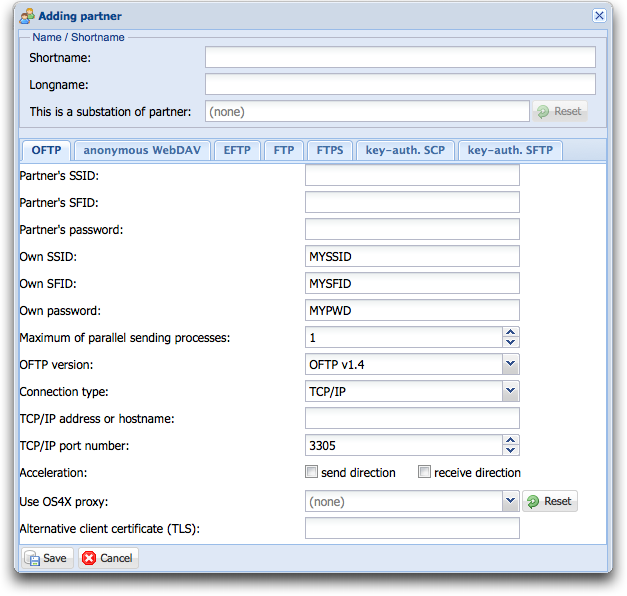Difference between revisions of "Creating partner"
| (2 intermediate revisions by the same user not shown) | |||
| Line 1: | Line 1: | ||
| − | In order to add a new partner, click on the "'' | + | In order to add a new partner, click on the "''Add partner''" button: |
| − | [[Image: | + | [[Image:vcard_add.png]] |
This leads you to the "''insert partner company''" form. | This leads you to the "''insert partner company''" form. | ||
| + | |||
| + | [[Image:Insert partner.png]] | ||
The pulldown menus of "''plugin package for send processes''" and "''plugin package for receive processes''" are used to define which plugin packages are run for this partner if a partner-based configuration is wanted. | The pulldown menus of "''plugin package for send processes''" and "''plugin package for receive processes''" are used to define which plugin packages are run for this partner if a partner-based configuration is wanted. | ||
| Line 18: | Line 20: | ||
The definition of the used OFTP version is available in the "[[Editing partner|edit]]" screen after created an entry, same to OFTP2 cipher suite variables and (if Seon Enterprise is installed) the plugin group configuration. | The definition of the used OFTP version is available in the "[[Editing partner|edit]]" screen after created an entry, same to OFTP2 cipher suite variables and (if Seon Enterprise is installed) the plugin group configuration. | ||
| − | [[Image: | + | The (optional, if properly configured and activated) field "ISDN call user data" may contain a definition of up to 16 values. Values can be defined in different ways: |
| + | *hexadecimal values: starting with "<code>0x</code>" or "<code>0X</code>", the next one or two characters are interpreted as case-insensitive hexadecimal value. Examples: | ||
| + | **<code>0x9a</code> | ||
| + | **<code>0X9a</code> | ||
| + | **<code>0xa</code> | ||
| + | **<code>0X9</code> | ||
| + | *decimal values: Without any prefix (say: without leading "<code>0x</code>" or "<code>0X</code>") values are interpreted as decimal integer values. Examples: | ||
| + | **154 | ||
| + | **32 | ||
| + | **5 | ||
| + | Since up to 16 values are possible, they are being delimited by a whitespace (<code>" "</code>). If more than one whitespace is used, it's being truncated. Example for valid configurations: | ||
| + | 0xc2 0x9a | ||
| + | |||
| + | 0x9a 142 43 0xd | ||
| + | If more than 16 values are defined, the following values after the 16th byte will be logged in the send log: | ||
| + | |||
| + | [[Image:Too long isdn call user data.png]] | ||
Latest revision as of 08:04, 30 August 2012
In order to add a new partner, click on the "Add partner" button:
![]()
This leads you to the "insert partner company" form.
The pulldown menus of "plugin package for send processes" and "plugin package for receive processes" are used to define which plugin packages are run for this partner if a partner-based configuration is wanted.
The amount of parameters is highly dependant of the configured partner table schema. Only available columns in the database schema lead to an form entry, so if you define i.e. the OFTP TCP/IP port to be used with default value (which is 3305), this configuration entry doesn't exist.
The parameters needed for a working partner are:
- shortname (which is the key for all commandline tools)
- Partner's and own OFTP parameters (SSID, SFID, password)
- valid connection type
- depending on the connection type, either ISDN number or TCP/IP address
- if TCP/IP connected: valid (or default) port numbers,
The definition of the used OFTP version is available in the "edit" screen after created an entry, same to OFTP2 cipher suite variables and (if Seon Enterprise is installed) the plugin group configuration.
The (optional, if properly configured and activated) field "ISDN call user data" may contain a definition of up to 16 values. Values can be defined in different ways:
- hexadecimal values: starting with "
0x" or "0X", the next one or two characters are interpreted as case-insensitive hexadecimal value. Examples:0x9a0X9a0xa0X9
- decimal values: Without any prefix (say: without leading "
0x" or "0X") values are interpreted as decimal integer values. Examples:- 154
- 32
- 5
Since up to 16 values are possible, they are being delimited by a whitespace (" "). If more than one whitespace is used, it's being truncated. Example for valid configurations:
0xc2 0x9a
0x9a 142 43 0xd
If more than 16 values are defined, the following values after the 16th byte will be logged in the send log:

